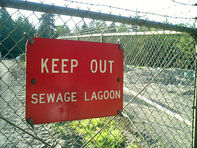
by Long Island Attorney Paul A. Lauto, Esq.
The disposal of America's waste and garbage is a growing problem with limited solutions. Landfills are filling up across our country, waste is turning up in our waters and Americans still tend to be lazy when it comes to recycling. So what are we to do with all of our waste and in particular our sewage? Our government's answer in part, is to return it to the food supply.
As absurd as the title question to this article sounds, it is a question that perhaps we all need to ask ourselves before buying our food. The use of treated sewage or biosolids to fertilize crops, has long been accepted and approved in the United States by the FDA, EPA and USDA. In fact the sewage sludge used in agriculture is regulated under the Clean Water Act. Fertilizers are actually made from treated domestic septage and sewer sludge and called biosolids.
According to the epa.gov, "Once the wastewater reaches the plant, the sewage goes through physical, chemical and biological processes which clean the wastewater and remove the solids. If necessary, the solids are then treated with lime to raise the pH level to eliminate objectionable odors. The wastewater treatment processes sanitize wastewater solids to control pathogens (disease-causing organisms, such as certain bacteria, viruses and parasites) and other organisms capable of transporting disease." Our government maintains that the use of sewage fertilizers in our food, is safe and presents a "negligible risk" to consumers. Further, that it helps prevent our landfills from filling up and is good for the environment.
Is this another case of truth being stranger than fiction or is our government correct in saying sewage fertilizers are perfectly safe? If you are among those who prefer your food to be sewage free, it appears buying organic is the only way to achieve that goal. Perhaps we can now understand a little more as to why our elders tend to refer to the "good old days." There once was a time when food did not have to be labeled organic, because all of the food was organic derived. Consumers did not have to be concerned with the ramifications of GMO's, glyphosate, 2 4D herbicide and treated sewage showing up in their food. Maybe if we all listened a little more closely to our elders instead of rolling our eyes when they told those stories about the good old days, we would all be a lot better off today.
Long Island Lawyer
Paul A. Lauto, Esq.
www.liattorney.com


 RSS Feed
RSS Feed

